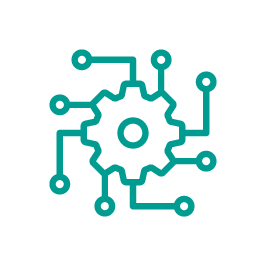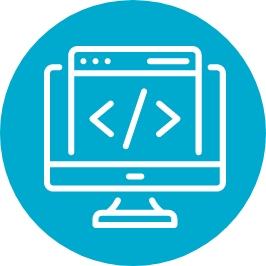What is Robotic Process Automation (RPA)?
RPA harnesses digital workhorses (bots) that can carry out computer-based processes they have been programmed to do, working just like a human would – except they can work 24x7, 365 days a year and do not make mistakes!
If a process is rule based and requires the use of a keyboard or a mouse, it has the potential to be automated using intelligent RPA.
The system is particularly beneficial where processes are repetitive with minimal variation in how data is processed.
RPA and digital automation in the NHS
A bot can be programmed to log into a system with its own username and password to complete the task it has been ‘trained’ to do.
A bot cannot ‘think’ for itself, but simply does the work it has been programmed to do before logging out again.
Support in your RPA Journey
THIS supports, manages and develops robotic process automations on the Blue Prism platform, a market leader in RPA for the NHS, utilised by as many as 56 other NHS trusts.
See below to learn more about what RPA is and how THIS can support you in reaching your goals.
Discuss your requirements
Not sure which services you require? Our team is here to help. We reflect NHS values of professionalism, service and accessibility. We are here to explain options, provide solutions and serve diverse clients. You’re guaranteed a friendly welcome, expert advice and ongoing support. Get in touch for more details.
How we can support your RPA journey
Our RPA service includes support, management and development of robotic process automations on the Blue Prism platform.
As the market leader in RPA for the NHS, Blue Prism is an ISO 270001 accredited, UK-based company with over 2,000 customers, and a 98.4% retention rate. 56 NHS Trusts are currently using its technology.
Our RPA service options at a glance
Automation development and consultancy: We can leverage the Blue Prism platform to create tailored automation solutions that align with your organisation’s unique business requirements. This involves innovating new workflows, refining existing processes and ensuring operational resilience through rigorous testing and maintenance.
Control room management: To ensure seamless operations of the automation ecosystem by proactively managing your Control Room. This includes minimising downtime, optimising schedules and maintaining robust performance monitoring to support workflows.


Our RPA service options in more detail
Automation development and consultancy
We will collaborate with you to design, develop, and test automations on the Blue Prism platform. This includes:
- Automation design: Interpreting process definitions to design RPA workflows.
- Development & testing: Build the objects and components required for automation and test them in the development environment.
- Deployment & maintenance: Move automations into production and support user appliance testing with live data. We also proactively update automations to ensure alignment with evolving organisational needs.
Control room management
We will ensure the smooth running of your Blue Prism RPAs and address issues if/when they arise. This includes:
- Monitoring & scheduling: Overseeing your daily Blue Prism automations to monitor performance. Ensuring your RPAs are scheduled to your requirements.
- Response: Provision of a first-line issue resolution service and escalating complex failures as required
- Collaboration: Working with the development team to address identified improvements or fixes
- Performance reporting: Generating performance reports and incident reports recommending enhancements for automation efficiency.
Benefits of RPA
We have calculated that one bot is capable of doing the equivalent work of 4.5 human whole time equivalents (WTE), creating a total output equal to 22.5 human WTEs, a huge increase in capability and time saved that can then be spent on enhancing the patient’s journey and their care.
The benefits RPA:
- It supports digital transformation.
- Creates cost savings through improved productivity.
- Better workload management.
- Improved accuracy and compliance.
- More clinical time to enable better patient outcomes.
- It alleviates the administrative burden consuming small, time-poor teams.
- Improves job satisfaction and morale.
The implementation of intelligent RPA is a key enabler to support a Trust’s digital strategy. It would enable it to:
- Run processes 24/7, 365 days a year, therefore minimising the accumulation of backlogs and significantly increasing productivity and improving patient care.
- Facilitate a reduction of clerical and admin agency spend, driving out waste.
- Enable more flexibility for restructuring administrative departments to drive future cost improvement and efficiency benefits.
- Remove the need to replace staff who leave roles that can be automated.
- Improve employee morale and satisfaction by removing repetitive, manual tasks from their roles, supporting the ‘better health, for life’ vision.
- Facilitate a concurrent rationalisation of our estate as more roles are automated.
Our RPA Projects
The success of an RPA programme lies in identifying small teams with heavy and mundane admin burdens. Here are some examples of how we have employed RPA to benefit teams within our host trust.

RPA project one – speeding GP referrals
Using bots to support our host trust’s clinical assessment service (CAS) and validation teams, is releasing almost 17,000 hours of work time per year. A bot logs on to the E-referral system each morning, pulling in a list of patients booked into clinic. For each patient, it goes into the referral, finds all the patient information that a GP has provided and downloads it. It then merges all the information into one document, and uploads it into the EPR system, ready for the patient’s appointment with their consultant.

RPA project two – easing the admin burden in Radiology
In radiology, bots are accepting between 300 and 400 scan requests per day, and are capable of booking routine, plain film X-ray scans for patients. In addition, bots can process scan requests from a waiting list, book an appointment and create a letter that goes to a postal service provider to be sent to patients. Analysis of the bots’ impact on these two simple radiology processes shows time equivalent to one WTE has been saved by automation.

RPA project three – combating health inequalities
Bots are being used to add ‘inequality flags’ to a patient’s record in our host trust’s EPR, alerting clinicians to the potential need for a specific care package or pathway. With waiting lists containing up to 5,000 patients at any one time, bots can keep a rolling database up to date with the relevant markers - a task that would take an admin team hundreds of hours to complete. Programmed to do this overnight, with one bot is capable of processing up to 500 patients in one session.
FAQ's
What does RPA stand for?
RPA stands for Robotic Process Automation, which uses software in the form of digital workhorses (bots) to automate simple, repetitive business practices. This technology is being called the ‘fourth industrial revolution’ and is capable of delivering a step change in the way work is executed across the NHS. By using intelligent automation - or cognitive automation - a bot can emulate the way people use digital systems, the decisions they make and the processes they follow.
What is RPA?
RPA uses bots to emulate the way people use digital systems, the decisions they make and the processes they follow. If a process is rule based and requires the use of a keyboard or a mouse, it has the potential to be automated using intelligent RPA, which use software (bots) to carry out computer-based processes they have been programmed to do. RPA is particularly beneficial where processes are repetitive with minimal variation in how data is processed.
A bot can be programmed to log into a system with its own username and password to complete the task it has been ‘trained’ to do. A bot cannot ‘think’ for itself, but simply does the work it has been programmed to do before logging out again. As bots are able to work 24/7, 365 days a year. We have calculated that one bot is capable of doing the equivalent work of 4.5 human whole time equivalents (WTEs), creating a total output equal to 22.5 human WTEs.
How does RPA work?
Intelligent RPA uses software (bots) to do the work that is usually done by a human but is mundane and repetitive. By using intelligent automation - or cognitive automation - a bot can emulate the way people use digital systems, the decisions they make and the processes they follow.
A bot can be programmed to log into a system with its own username and password to complete the task it has been ‘trained’ to do. A bot cannot ‘think’ for itself, but simply does the work it has been programmed to do before logging out again. It can work 24x7, 365 days a year and does not make mistakes!
If a process is rule based and requires the use of a keyboard or a mouse, it has the potential to be automated using intelligent RPA. The technology can work across IT applications, transferring key information from one system to another without the need to directly integrate the two systems.
NHS bodies work with a vast array of IT systems that will eventually need substantial investment in time and money to update and integrate. Bots are a relatively inexpensive way of integrating systems quickly to improve both the patient experience and the working lives of clinicians.
Find out more about our other services

Bespoke Service
In addition to our core services of digital health solutions, we offer bespoke services and can tailor our solutions to each customers’ needs. We can combine a number of services into a package, discuss other service solutions that your organisation may benefit from, including new innovations and collaborative projects. Contact us to discuss your requirements.

Request a free consultation
Want to know more? We offer face-to-face or online demonstrations of our services along with brochures and other information resources to suit your needs. Get in touch to see how we can help.
Request
Case studies and insights
As a leading digital healthcare organisation with proud NHS links, we believe in sharing insights into the work we do, the issues our clients face and the latest developments in our field. View all our case studies and insights.
What our customers have to say
“THIS have provided Spectrum Community Health with quality service for over 10 years. They consistently strive to meet our IT needs and digital ambitions in a supportive partnership approach.”
Sharon Hardcastle
Director of Finance, Spectrum Community Health CIC
Judy has asked for Spectrums thanks to be passed on to the Service Desk and all support staff for the efforts we are going to help and support them.
Judy Threlfall-Sykes
Head of Digital, Spectrum Community Health CIC
“Really want to thank Daniel P for all his help, he was really patient and helpful. Clearly communicated what he was doing and that he would contact me back to test that things were working.”
CHFT
"Problem quickly resolved and gave information about how to resolve in the future.”
Wakefield CCG
Who we work with
Supporting organisations throughout the UK
Across the UK, we work closely with NHS and healthcare organisations in many different locations. From our roots in Yorkshire, we support clients across England, Scotland, Wales and Ireland.
Examples of our NHS clients include London’s Great Ormond Street Hospital and hospital trusts in Southampton, Oxford, Cambridge, Nottingham, Derby, Birmingham, Liverpool, Manchester, Middlesbrough, North Tees & Hartlepool, Newcastle Upon Tyne, Edinburgh, Lanarkshire and Glasgow.


Subscribe to Informatics Insights & Advice
Take advantage of the latest news and information from The Health Informatics Service. Read about our innovative work with healthcare clients across the UK and get our expert insights and recommendations to help and inspire your work.







